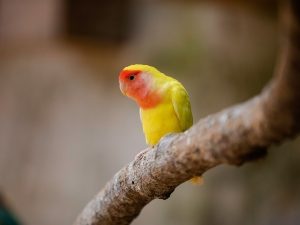
Changes to any part of your lovebird’s body, the beak included, may be concerning to any lovebird owner. Love birds usually have red or yellow, not black, beaks.
This article is a look into why your lovebird’s beak is turning black.
Table of Contents
Why is my love bird’s beak turning black?
The beaks of birds can change a great deal over the bird’s lifetime both in shape and in color, and one color that your bird’s beak can change to is black.
Here is what may be happening if your bird’s beak is black:
Your bird is young:
Lovebirds naturally hatch with black beaks, the color of their beaks starts to change as the bird gets older.
If your bird is a bit older then the bird’s beak may have changed color from black to a lighter color but some of the black color from when it was young may still be on the bird’s beak.
What to do:
This is normal and isn’t something to worry about, your bird’s beak may fully turn a different color or it may stay as it is.
As long as the bird isn’t showing signs of distress along with the beak color change then you don’t have to worry.
It’s the bird’s toys:
Birds will rub their beaks on a variety of things and will rub their beaks on the surfaces around them.
If your bird has any dark-colored toys that it likes to play with then the color on the toys may have rubbed off on the bird’s beak causing the beak to turn darker in some areas.
What to do:
You can investigate this theory by using a warm and damp cloth to rub against the bird’s beak to see if you can clean the beak.
If the black is removed by the cloth then the toys were the likely culprit, you may want to get your lovebirds some new toys.
It’s a bruise:
One of the simplest reasons why your bird’s beak may be turning black may be because the bird’s beak was injured and is now developing a bruise.
Bird beaks are actually living organs that can become damaged and can repair themselves.
The inner layer of the bird’s beak is made up of a hard bony layer that can’t bruise but the outside is made up of a keratin layer that can bruise.
If your bird’s beak is injured from another bird during a fight, or if the bird knocked its beak into something with great force then a bruise can develop on the bird’s beak.
The beak has blood vessels, if an injury develops then the blood vessels on the inner keratin layers will start to bleed out and cause the beak to develop a blue, purple, or black bruise which will show up on the bird’s beak making the beak look black.
The brighter your bird’s beak usually is the more visible the color change from the bruise will be.
What to do:
This isn’t something to worry too much about, beak bruises will usually heal themselves.
The blood in your bird’s beak will absorb back into the bird’s blood vessels and these blood vessels will close up and your lovebird’s beak will go back to its original color.
You would only have to worry if your bird starts showing signs of distress along with the beak turning black. You should also be concerned if your bird can’t pick up food anymore or is in pain.
If this is what is happening with your bird then it is advised that you take your bird to the vet for an examination and further treatment.
Fatty liver disease:
Another reason why your bird may have developed bruises on its beak is that the bird has fatty liver disease.
This disease is common in birds who eat a diet of mostly seeds. This disease develops when there is an accumulation of fat in the liver.
The disease can cause blood clots to develop all over the bird’s body and these blood clots can show up in the bird’s beak making the beak look black.
What to do:
This disease is not very common but it is very serious so if you think that this is what is going on with your bird then you’d need to take your bird to the vet to be examined and treated.
You’d need to change your bird’s diet after the bird has recovered from this ailment to keep this from developing again.
If you enjoyed this article then you may also be interested in other bird related articles. Here are some articles that you may be interested in: Why Do Birds Rub Their Beaks On The Fence, My Budgie’s Beak Is Crusty, Why Does My Sun Conure Click His Beak, Why Do Birds Drag Their Beaks, Why Is My Parrot Beak Turning Black?, Baby Lovebird Beak Black

